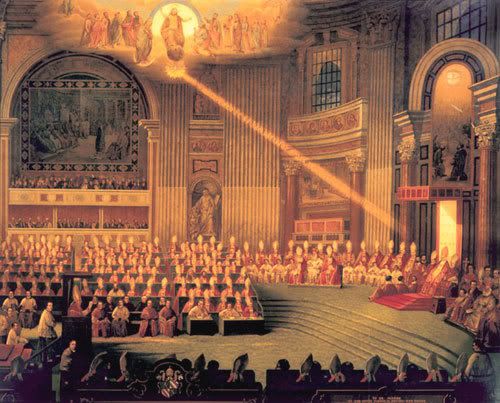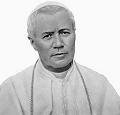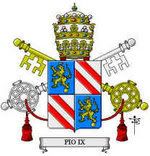Papal Infallibility

"We exhort you, honorable brother, that you obediently listen to what has been written by the blessed Pope of the city of Rome, since blessed Peter, who lives and presides in his own see, offers the truth of faith to those who seek. For we, in our zeal for peace and faith, cannot decide questions of faith apart from consent of the Bishop of Rome."
-- Peter Chrysologus of Ravenna to Eutyches, Ep 25
Papal infallibility is one of the most misunderstood dogmas among Catholics and non-Catholics alike. Many confuse infallibility for impeccability--an inability to sin. The Pope, however, can sin like any man (and history shows they do). Others think that everything that comes out of a pope's mouth or pen is infallible. This is likewise untrue. Certain sedevecantists and anti-popes fall into this trap. When they (erroneously) judge a recent pope to have professed some error, they are left with no choice to conclude the pope is illegitimate. So, when is the Pope infallible?
The Conditions for Papal Infallibility
Let us look at the actual dogmatic definition from the First Vatican Council:
"Therefore, faithfully adhering to the tradition received from the beginning of the Christian faith, to the glory of God our savior, for the exaltation of the Catholic religion and for the salvation of the Christian people, with the approval of the Sacred Council, we teach and define as a divinely revealed dogma that when the Roman Pontiff speaks EX CATHEDRA, that is, when, in the exercise of his office as shepherd and teacher of all Christians, in virtue of his supreme apostolic authority, he defines a doctrine concerning faith or morals to be held by the whole Church, he possesses, by the divine assistance promised to him in blessed Peter, that infallibility which the divine Redeemer willed his Church to enjoy in defining doctrine concerning faith or morals. Therefore, such definitions of the Roman Pontiff are of themselves, and not by the consent of the Church, irreformable."
And from the Second Vatican Council:
"And this infallibility with which the Divine Redeemer willed His Church to be endowed in defining doctrine of faith and morals, extends as far as the deposit of Revelation extends, which must be religiously guarded and faithfully expounded. And this is the infallibility which the Roman Pontiff, the head of the college of bishops, enjoys in virtue of his office, when, as the supreme shepherd and teacher of all the faithful, who confirms his brethren in their faith, by a definitive act he proclaims a doctrine of faith or morals. And therefore his definitions, of themselves, and not from the consent of the Church, are justly styled irreformable, since they are pronounced with the assistance of the Holy Spirit, promised to him in blessed Peter, and therefore they need no approval of others, nor do they allow an appeal to any other judgment. For then the Roman Pontiff is not pronouncing judgment as a private person, but as the supreme teacher of the universal Church, in whom the charism of infallibility of the Church itself is individually present, he is expounding or defending a doctrine of Catholic faith."
So, let's draw out the three conditions 1) Infallibility only applies to doctrines on faith and morals, the revelation of God, the deposit of faith, entrusted to the Church--therefore it does not include teaching on science, historical facts, pastoral policy, other religions, etc. 2) The Roman Pontiff must be exercising his office as shepherd and teacher of all Christians--therefore he is not infallible if he is acting in his capacity as bishop over his individual diocese, as a private theologian, etc. 3) Going hand in hand with the previous two conditions, he must be definitively proclaiming a doctrine to be held by the entire Church--therefore he is not infallible when only addressing portions of the Church or when he intends to encourage further speculation or discussion on the doctrine.
In summary, the Pope is infallible when he definitively proclaims the truth of a doctrine which every member of the Church is bound to accept. This usually happens when controversy or confusion arises in the Church over some doctrine and the pope definitively settles the doctrinal dispute.
The Rationale Behind this Dogma
Isa. 59:20 And there shall come a, redeemer to Sion, and to them that return from iniquity in Jacob, saith the Lord. 21 This is my covenant with them, saith the Lord: My spirit that is in thee, and my words that I have put in thy mouth, shall not depart out of thy mouth, nor out of the mouth of thy seed, nor out of the mouth of thy seed's seed, saith the Lord, from henceforth and for ever.
Why must these definitions be infallible? As the Scriptures and Tradition testify, God has promised that His Church will be indefectible and infallible by the power the Holy Spirit, the Spirit of Truth. The Truth revealed by God will always be preserved here. The Bishop of Rome has always had the final say on matters of doctrine--even the definitions of Ecumenical Councils cannot be binding on the whole Church unless they are approved by the Roman Pontiff. For further reading on this authority of the Pope, check out this section of St. Thomas Aquinas' Summa Theologica (since this entry is not meant to be a defense of the doctrine, but rather an explanation of it, I will refrain at this time from presenting the proofs this authority from Scripture and Tradition). The Pope has authority over the whole Church, so if he were to define an error to be held by the entire Church, the entire Church will have defected--and God has promised this will not happen. Therefore, the pope cannot define error in such a way--he is infallible. It likewise follows that he cannot prohibit the Church from believing truth revealed by God. In this way, according to the Ven. John Cardinal Newman, a contemporary of the definition, infallibility is also "engaged in...the condemnation of particular and given errors."
Examples of Infallibility
It seems to be a popular opinion that there are only two examples of this infallibility being exercised--the two Marian dogmas (Immaculate Conception and Assumption). Since only one was defined before Vatican I, this would lead us to believe the Fathers of the First Vatican Council based their definition on one example. This simply is not the case. In my study of papal writing, I have come across other examples as well. Here we will briefly discuss them (this list is not meant to be exhaustive--it merely represents what I have come across in my personal study):
Leo I, definition of the two natures of Christ
In his famous Tome, Leo settles the Monophysite controversy once and for all by sending his definition to be received by all the bishops assembled at Chalcedon, and thereby to be received by the whole Church. This is a definitive proclamation of a dogma to be held by the entire Church.
Agatho, definition on the two wills of Christ
In this letter, Agatho settles the Monothelite controversy at the request of the Patriarch of Constantinople, by sending his definition to be received by all the bishops gathered for the Third Council of Constantinople, and thereby the whole Church. They received it again as if it came from Peter himself.
Boniface VIII, definition concerning the necessity for salvation of union to the Church governed by the Roman Pontiff
Many find this definition contained in Unam Sanctam problematic. First it bears pointing out that much of this Bull pertains to certain historical conditions in medieval Europe, and not necessarily to the faith of the Church as a whole. But, the last line cannot be disputed as being a definitive proclamation applying to the whole Church. "Furthermore, we declare, we proclaim, we define that it is absolutely necessary for salvation that every human creature be subject to the Roman Pontiff." This teaching was later expressed by John XXIII in the 1950s: "The Saviour Himself is the door of the sheepfold: 'I am the door of the sheep.' Into this fold of Jesus Christ, no man may enter unless he be led by the Sovereign Pontiff; and only if they be united to him can men be saved, for the Roman Pontiff is the Vicar of Christ and His personal representative on earth." (Pope John XXIII, homily to the Bishops assisting at his coronation on November 4, 1958Papal Teachings: The Church, Benedictine Monks of Solesmes, Boston, St. Paul Editions, 1962, par. 1556.) What this teaching means is that union to the Church in some way is necessary for salvation, since the divine life flows through the Body from the Head (Jesus) to the members (the Church). Sacramental Baptism and the desire for Baptism, even implicit desire, is enough to create this union. This whole Church by divine ordinance is entrusted and subject to the Roman Pontiff, the successor of St. Peter. It is necessary for salvation to be subject to the pope because it is necessary for salvation to be united to the Church.
Benedict XII, definitions concerning the Beatific Vision and mortal sin
In his constitution, Benedictus Deus, Benedict XII once and for all ends a controversy caused by the erroneous (due possibly to senility) musings of his predecessor, John XXII, who was acting as a private theologian.
Innocent X, definitions concerning the Jansenist errors
In his Constitution, Cum Occasione, Innocent X definitively condemns the Jansenist errors.
Innocent XI, definitions concerning the Quietist errors
In his Apostolic Constitution, Coelestis Pastor , the Quietist errors are judged and condemned with Supreme Apostolic authority by Innocent XI.
Pius VI, definitions concerning additional Jansenist errors
Auctorem Fidei is an additional list of Jansenist errors and are condemned by Pius VI. The condemnations are infallible where they refer to doctrinal truths rather than specific historical conditions.
Clement XI, definitions concerning the errors of Paschasius
In his Dogmatic Constitution, Unigenitus, various errors of Paschasius are condemned by Clement XI and it is later declared that anyone who embraces them is outside the bosom of the Church. Again, infallibility only applies to statements of doctrine, not historical fact or situations.
Pius IX, definition of the Immaculate Conception of Mary
To end any and all doubt, in the Constitution, Ineffabilis Deus , Pius IX definitively proclaims that Mary was born free from all stain of original sin.
Pius XII, definition of the Glorious Assumption of Mary
To end all doubt, Pius XII definitively proclaims that Mary was taken up body and soul into Heaven in the Constitution Munificentissimus Deus.
Now, the next two I am going to discuss are controversial--not as to the truth, but as to whether papal infallibility was engaged. While such luminaries as then Cardinal Ratzinger have said they are simply part of the universal Magesterium--and are therefore infallible because they have always been taugh--but papal definitions are infallible in the same way, as well as the mark of the extraordinary Magesterium--I think this universal aspect was emphasized so that people would not think they can dissent from all teachings that are not extraordinarily defined by the pope.
Paul VI, definitive proclaims artificial contraception to be immoral
In Humanae Vitae, Paul VI definitively proclaims artificial contraception and sterilization as gravely immoral. First he proclaims his authority to do so:
"Such questions required from the teaching authority of the Church a new and deeper reflection upon the principles of the moral teaching on marriage: a teaching founded on the natural law, illuminated and enriched by divine revelation.
"No believer will wish to deny that the teaching authority of the Church is competent to interpret even the natural moral law. It is, in fact, indisputable, as our predecessors have many times declared,[1] that Jesus Christ, when communicating to Peter and to the Apostles His divine authority and sending them to teach all nations His commandments,[2] constituted them as guardians and authentic interpreters of all the moral law, not only, that is, of the law of the Gospel, but also of the natural law, which is also an expression of the will of God, the faithful fulfillment of which is equally necessary for salvation.[3]"
Before giving the definitive teaching, he states: "Therefore, having attentively sifted the documentation laid before us, after mature reflection and assiduous prayers, we now intend, by virtue of the mandate entrusted to us by Christ, to give our reply to these grave questions."
He is exercising his supreme authority to definitively declare doctrines of faith and morals. Then he issues the definition:
"In conformity with these landmarks in the human and Christian vision of marriage, we must once again declare that the direct interruption of the generative process already begun, and, above all, directly willed and procured abortion, even if for therapeutic reasons, are to be absolutely excluded as licit means of regulating birth.[14]
Equally to be excluded, as the teaching authority of the Church has frequently declared, is direct sterilization, whether perpetual or temporary, whether of the man or of the woman.[15] Similarly excluded is every action which, either in anticipation of the conjugal act, or in its accomplishment, or in the development of its natural consequences, proposes, whether as an end or as a means, to render procreation impossible."
He, as a result of His Supreme teaching authority granted by Christ has definitively declared the truth to answer all questions concerning the veracity of this doctrine and he has bound all Catholics to obey as a necessity of salvation.
John Paul II, definitively proclaims that only men can be ordained
In his letter, Ordinatio Sacerdotalis , John Paul II ends all doubt by proclaiming the doctrine that only men can be ordained. This letter is very straightforward and contains the classic and obvious marks of infallibility. The pertinent part is as follows:
"Although the teaching that priestly ordination is to be reserved to men alone has been preserved by the constant and universal Tradition of the Church and firmly taught by the Magisterium in its more recent documents, at the present time in some places it is nonetheless considered still open to debate, or the Church's judgment that women are not to be admitted to ordination is considered to have a merely disciplinary force.
"Wherefore, in order that all doubt may be removed regarding a matter of great importance, a matter which pertains to the Church's divine constitution itself, in virtue of my ministry of confirming the brethren (cf. Lk 22:32) I declare that the Church has no authority whatsoever to confer priestly ordination on women and that this judgment is to be definitively held by all the Church's faithful."
As we can see, he specifically declares he is speaking in his role as Supreme Pastor--his ministry of confirming the brethren--and makes it definitively binding on all the faithful. He also specifically says this is not a matter of discipline, but faith and morals. All of the elements are fulfilled explicitly.
Finally, John Paul II, definitivey proclaims the immorality of killing innocents and procuring abortions
In his encyclical, Evangelium Vitae , John Paul II, with the supreme authority of St. Peter, makes two definitions concerning killing the innocent and procuring abortions.
"Seest thou how [Christ], His own self, leads Peter on to high thoughts of Him, and reveals Himself, and implies that He is Son of God by these two promises? For those things which are peculiar to God alone, (both to absolve sins, and to make the church in- capable of overthrow in such assailing waves, and to exhibit a man that is a fisher more solid than any rock, while all the world is at war with him), these He promises Himself to give; as the Father, speaking to Jeremiah, said, He would make him as "a brazen pillar, and as a wall;"but him to one nation only, this man in every part of the world."
--St. John Chrysostom, Homily on the Gospel of Matthew.














